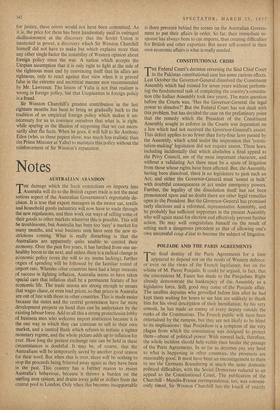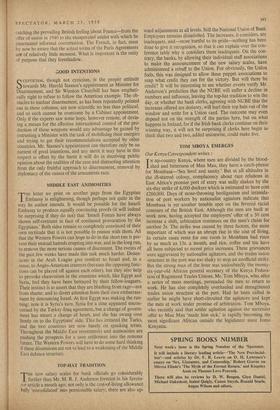POUJADE AND THE PARIS AGREEMENTS T HE final destiny of the
Paris Agreements for a time appeared to depend not on the needs 'of Western defence. or even on the views of the French legislature, but on the whims of M. Pierre Poujude. It could be argued, in fact, that the concessions M. Faure has made to the Poujadiste Right already demonstrate the bankruptcy of the Assembly as a legislative force. Still, good May come of .the Poujade affair. The satellite deputies who grovelled before him after he had kept them waiting for hours to see him are unlikely to thank him for his vivid description of their humiliation; by his very conceit, he has made an enemy of every deputy outside the ranks of the Communists. The French public will have been entertained by the rumpus, but they are not likely to be blind to its implications : that Poujadism is a symptom of the very plague from which the constitution was designed to protect them—abuse of political power. With normal luck, therefore, the whole incident should help rather than hinder the passage of the Paris Agreements. In so far as deputies pay any heed to what is happening in other countries, the prospects are reasonably good. It must have been an encouragement to them to see the Germans floundering in much the same domestic political difficulties, with the Social Democrats reduced to an appeal to the Constitutional Court. The publication of the Churchill - Mendes-France correspondence, too, was conveni- ently timed. Sir Winston Churchill has the knack of exactly catching the prevailing British feeling about France—from the offer of union in 1940 to the exasperated asides with which he punctuated informal conitersation. The French, in fact, must by now be aware that the actual terms of the Paris Agreements are of relatively little moment. What is important is the unity of purpose that they foreshadow.



































 Previous page
Previous page